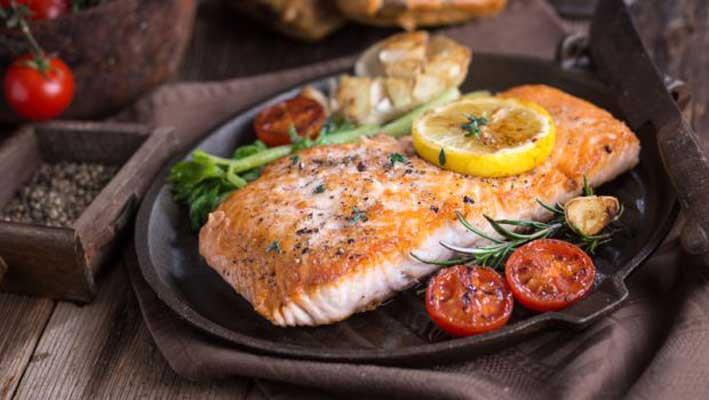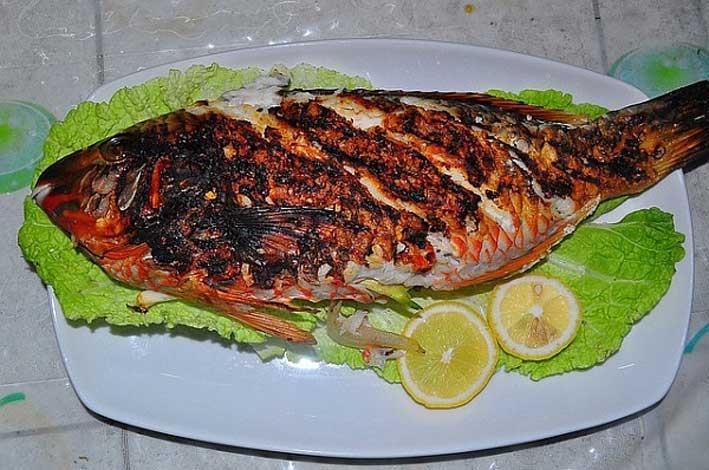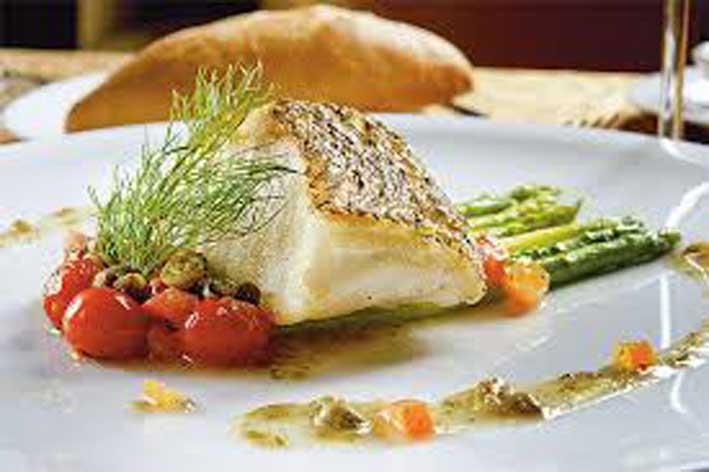Salmon is the most popular fish in Malta, JD Farrugia, an activist promoting sustainable fishing told The Malta Independent in an interview, referring to data which the ENGO he forms part of, Fish4tomorrow, collected in 2015.
“For me, this is a culinary tragedy,” he said. “Salmon is not a local fish, yet it is the one we tend to eat the most.” Salmon is usually imported from Northern European countries and will often be farmed in ways which are not considered sustainable.
The research into fish consumption habits of Maltese people also found that younger people tend to eat fish mostly in restaurants whilst older generations, depending on the geographical location, tend to be the ones to cook more fish at home. “For many, cooking fish seems like a daunting task and things like smell can actually be a hindrance in doing so,” he said.
In 2014, Fish4tomorrow published a pocket-size guidebook suggesting to consumers an array of local fish which could be eaten sustainably, and which should be eaten less due to conservation practices and are currently planning to begin research for a new guidebook.
When it comes to local fish, many of the fish that are in demand are also the ones which are least sustainable, such as tuna and swordfish steak. “Because they are steak fish and more popular, there is a bigger demand for them, so there will usually be the industrial effort to make sure that the fish is available,” he said.
Whilst swordfish are on a decline, and EU concern regarding swordfish illegal fishing ensues, the Government is not implementing quotas for swordfish this year.
Maltese ENGO Fish4tomorrow, a group striving to encourage a culture of sustainable seafood consumption and culinary exploration of local sea produce, would argue that when it comes to fish in Maltese waters, there is a lot more to explore than what one is generally accustomed to.

What can you tell us about Maltese culture and fish consumption?
“When Fish4tomorrow first started out, we tried to gather information about the health of the fish stocks in Malta, and as much scientific data as we could, through desktop research. When it comes to the sea, data is the biggest problem, yet one of the most important aspects of managing fisheries, and we believe very much that everything we say and promote has to be backed scientifically, which is perhaps one of our biggest challenges.
We also conducted research to study the fish consumption habits of Maltese people. What we found is that people, especially the younger ones, eat fish mostly in restaurants, whilst the older generations, depending on the part of the island, tend to be the ones to cook more fish at home. For many, cooking fish seems like a daunting task and things like smell can actually be a hindrance in doing so.
Most of the meat we eat doesn’t resemble the animal it is, and people usually don’t like to eat anything with a face, which is why, one thing we found is, steak fish is something which is more popular. Steak fish are the ones that are more overfished, so less sustainable.
We found that the most popular fish in Malta is salmon, which for me is a culinary tragedy. Salmon is not a local fish, yet it is the thing we tend to eat the most. Because steak fish is more popular, there’s a bigger demand for it. A lot of the popular fish are going to be the ones which are unsustainable because there is a demand for them so there is usually industrial effort to make sure that that fish is available as much as possible, whereas fish not in demand there is less supply for so generally speaking, it is more sustainable.”

In an environmentally-conscious manner, which fish should we be eating? Which fish should we be avoiding?
“When people found out the mission of our NGO, the first question they asked is ‘what fish should I be eating?’ and that’s quite a question, so one thing we did is work on a guide to help people choose more sustainable fish.
In the guide, which is called ‘Quickfish’, we found all kinds of seafood that you can eat in Malta and rated them on a 3-point scale. Starting from fish that we recommend as sustainable, have healthy stocks, usually caught in an environmentally conscious way and keeping in mind the socio-economic impacts, like Sawrell and Kavall, Lampuki and Klamar. We have 15 of these recommended fish on the guide.
Then we had fish on the other end of the spectrum, which we said should be avoided such as Pixxispad (Swordfish) and Tonn (Atlantic Bluefin Tuna), generally the ones you are more used to seeing at restaurants. We think people should preferably avoid eating this, either because the stocks are not doing very well like with Pixxispad (Swordfish) or Cerna (Dusky Grouper), or the method used is very harmful, like industrial long lines of hooks that catch unselectively or bottom trawling, which aren’t very friendly.
Then there are those to eat in moderation; so either they are in a healthy state but the way they are being caught isn’t that great, or vice-versa, or generally speaking there is just not enough data on them. There are many gaps of data when it comes to fish, where we made educated guesses, you could say.
The guide came out three years ago so it’s good for them to keep reviewing, which we are going to start working on now, for a revamped list.”

Recommended: Kavall, Sawrell, Plamtu, Imsella, Kahlija
“Sawrell (Horse Mackarel) and Kavall (Atlantic Mackarel) are a perhaps unlikely but delicious choice. Mackerel is usually seen as cat food, but I personally think they are my favorite fish, the flavor of Kavall (Atlantic Mackerel) is delicious, so much better than a swordfish or tuna steak, and it’s crazy cheap. I bought two sawrell for less than two euro last week. Furthermore, they are resilient fish, they can take quite an amount of fishing, they are caught by traditional fishermen and they can be prepared in the typical ways.
Lampuka (Dolphin Fish) and Klamar (Squid) are also sustainable when caught locally, however at this point in time is not always easy to identify. When eating at a restaurant you could ask your waiter about the source. From the side of the restaurant, it is nice to see an element of pride when they explain from where they got their food.
Plamtu (Atlantic Bonito), Imsella (Garfish) and Kahlija (Saddled Seabream) are also delicious, underrated fish. If you look at old Maltese recipe books you used to find some mentioned, especially Kahlija, now you don’t really find it mentioned anywhere, even though it is from the same family as the more popular Awrata (Gilthead Seabream).
What we are doing, mostly, is about the exploration and celebration of local food and local fishing techniques, of local flavours.”
‘A problem we are very concerned about is the fish labeling system in Malta’
“A problem we are very concerned about is the labeling system in Malta, the way you see your fish before you buy it. It can be very misleading. There’s a lot of sea food fraud, where people label one thing when in reality it’s something else, they say it’s wild Awrata (Gilthead Seabream) when it’s not, for example.
There were some EU requirements for labeling which were supposed to come into place a couple of years ago and we still haven’t really seen it on a full scale. There are some places where you see it happening, but it should be that all labels have the scientific, local names of the fish and there should also be a database which has all these listed to avoid confusion, the method that it was caught and the area which it was caught should also be added.
When it was about to come into play a few years ago we got very excited about it, it would help us promote sustainable fish and would decrease seafood fraud, decrease illegal fishing and so forth. So we were very happy to speak the authorities about it and offer our help as much as we could as an NGO, and we had a few interesting meetings a few years ago and everyone seemed keen but there was a lot of to-ing and fro-ing, some things become the responsibility of other departments, and it became one of those situations where you eventually get stuck in a bit of a black hole.
I believe something is already happening, but I don’t think it survives through the whole process of the fish being landed till the fish being bought. What we were told when we spoke to the department of fisheries is that fish comes in, it is weighed, some information is put in by the fisheries officer and the label is printed and put on that box, so at that point you should not be able to meddle with it.
But then, most of the places I go to buy fish, there are always these laminated cards with ink, sometimes you can’t understand the hand writing, sometimes English, sometimes Maltese, it confuses a lot of people.”

Malta does not have a swordfish quota this year. What is your comment on this?
“European fisheries are managed at a top level by the European Union. Every year specific committees make decisions as to how many fish are allowed to be caught on a European level, then it’s divided between countries, then up to countries to further divide within their country. Every country has different criteria. Basically every fisherman will have a limit and would not be able to legally fish over that limit.
Up until this year, the only fish we have had quota for is tuna. Tuna was in the brink of collapse in 2007, I believe, EU stepped in based on scientific data and they started setting yearly quotas. That made a difference but we believe we are still a long way away but the recovery signs are there.
Recently there has been a similar cry for swordfish, who we think are in a worse state than tuna. It is being overfished, there’s a lot of illegal fishing going on with swordfish. The Mediterranean is a depleted source of fish in general. 90% of fish stocks in the Mediterranean are over-fished, that’s a whopping number, and swordfish are one of the worst.
As per the pre-election promises, as we checked, the Maltese government has implemented they are not going to implement quotas this year. With regards to tuna, it’s improved but we still don’t think it’s sustainable. ICCAT (International Commission for the Conservation of Atlantic Tunas) reports said there have been positive signs yet there is still a way to go there are still large gaps in the data.
It has been recommended to follow quotas from scientific advice, policies should be created on scientific advice, it’s the right thing to do. Sometimes it’s very sad that it must be civil society to be the ones who have to do the research.”
As an NGO you support small scale fishing operations. What is their current situation?
“Generally speaking, the large industrial fishing operations have left a negative impact on both small scale fishermen and fisheries in general, like large scale agriculture industries too.
Fish is probably the only industrially-hunted animal that we eat. We are hunting things industrially, that has had a negative impact on many fish stocks, which has led to a lot of overfishing and small scale fishing because fish stocks would be depleted. But industrial fishing, like industrial anything, has a lobby. That means they have stronger pull and influence on policy makers, you can afford to have people in Brussels pushing for your cause, being supported by the EU to get bigger and richer.
Small-scale fishing operations make up 90% of fishing operations, in terms of impact its much less, their impact is a lot smaller, but obviously still significant and still needs to be regulated with quotas etc. but by nature most are very environmentally conscious and we have spoken to small scale fishermen and their goals are long term not short term profit, there’s this understanding of sustainability and preserving fish stocks, so as an NGO we tend to promote fish caught by small scale fishing operations.”
Fish4tomorrow hold regular events called ‘From Our Seas’, where local restaurants serve meals centred around sustainable, local fish, to promote the taste and variety of what our seas have to offer, away from the more common, less sustainable dishes.
The ‘Quickfish’ guide to environmentally conscious seafood choices can be downloaded on www.fish4tomorrow.com.